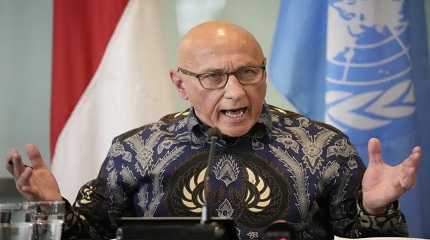
JAKARTA, Indonesia (AP) — An independent expert working with the United Nations on the issue of human rights in Myanmar urged the international community on Wednesday to find a different approach to resolve the crisis in the Southeast Asian country, saying the current course of action is not working.
Tom Andrews, a special rapporteur working with the U.N. human rights office, told a news conference in Jakarta the world is looking to Indonesia and the Association of Southeast Asian Nations for leadership on the situation in Myanmar.
“I came to Indonesia because the human rights situation in Myanmar is dire and getting worse, and because I believe that Indonesia is positioned to play a critical role in the resolution of this crisis,” Andrews said after meeting with Indonesian and ASEAN officials.
Myanmar’s crisis began after its military in February 2021 seized power from the elected government of Aung San Suu Kyi. The takeover prompted widespread public protests, whose violent suppression by security forces triggered an armed resistance that now spans much of the country.
Andrews, a former U.S. congressman, said the situation in Myanmar is also losing visibility outside of the country.
He said the Myanmar military has killed more than 3,600 civilians since the crisis began, while more than 19,000 people have been jailed as political prisoners.
ASEAN, of which Myanmar is a member, two years ago agreed on a five-point plan that includes a call for an immediate stop to killings and other violence and the start of a national dialogue. The military rulers in Myanmar initially accepting the plan, but have made little effort to implement it.
Andrews said the 10-member regional bloc should not invite the junta to any of its meetings and should not allow Myanmar military personnel to participate in defense meetings.
“I cannot help but have the impression that there are two different time zones when it comes to ASEAN and the crisis in Myanmar: one being the reality of the people of Myanmar who face daily attacks by junta forces and rapidly deteriorating conditions. The other is the world of ASEAN officials who caution that progress could take years, even decades,” he said.
“The people of Myanmar do not have decades. They need a strong international response to the crisis that is carried out in the same ‘time zone’ as the brutal attacks that they are suffering,” he said.
Special rapporteurs work with the U.N. human rights office in Geneva based on mandates handed out by the U.N.-backed Human Rights Council, a 47-member body that currently counts both China and Russia as members.




